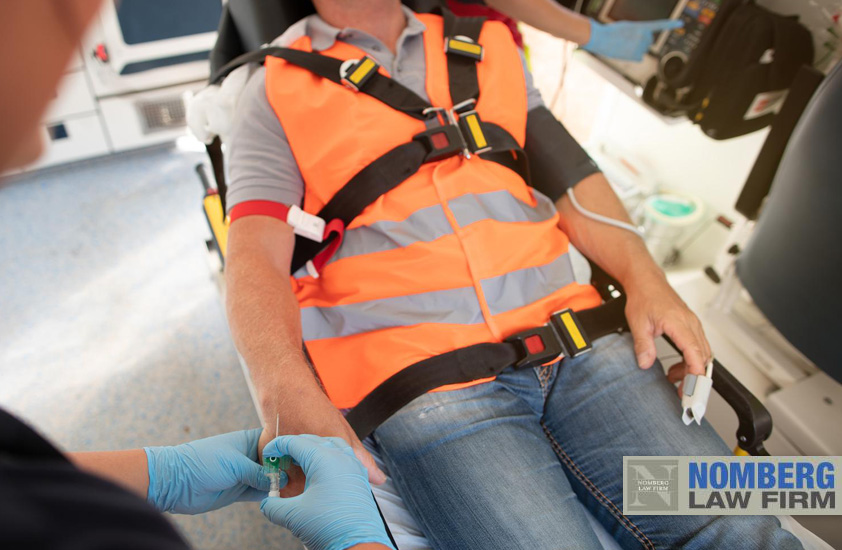Alabama first responders, including firefighters, police officers and emergency medical technicians (EMTs), dedicate their lives to serving and protecting our communities, often placing themselves in harm’s way to do so.
Given the inherently high risk of injury, illness and disease associated with their critical roles, it’s essential for these brave individuals to know that they may be eligible for workers’ compensation benefits for conditions directly related to their duties.
In Alabama, the workers’ compensation system provides a safety net, offering support for those who suffer from work-related injuries or health issues. This article aims to guide first responders through the process of obtaining the workers’ comp benefits they rightfully deserve, acknowledging their invaluable service and the physical risks they face daily.
What are the most common injuries for first responders?
First responders are exposed to a wide range of hazards that can lead to various work-related injuries, illnesses and occupational diseases (health conditions that develop from long-term exposure to harmful substances or environments).
Some of the most common include the following:
- Musculoskeletal injuries. These are prevalent among first responders due to the physical nature of their work, including lifting, carrying heavy equipment and rescuing individuals. Common injuries include sprains, strains and back injuries.
- Burns and smoke inhalation. Firefighters, in particular, are at a high risk of burns, smoke inhalation and related respiratory issues due to exposure to fires and hazardous materials.
- Broken bones. First responders can sustain broken bones during physically demanding tasks such as extricating victims from vehicles or due to a slip, trip or fall. These injuries can range from simple fractures that require minimal treatment to complex breaks needing surgery and extended rehabilitation.
- Spinal cord injuries. Spinal cord injuries among first responders can result from falls, vehicular accidents or violent encounters. Such injuries can lead to partial or complete paralysis, necessitating long-term medical care and possible lifestyle adjustments.
- Cuts and lacerations: Encounters with sharp objects or broken glass during rescues or law enforcement activities can lead to cuts and lacerations.
- Stress-related illnesses. The high-stress situations that first responders face regularly can lead to mental health issues like post-traumatic stress disorder (PTSD), anxiety and depression.
- Hearing loss. Prolonged exposure to loud noises, such as sirens, explosions or machinery, can cause hearing loss in first responders. This condition may be gradual, reducing the ability to hear over time, or sudden, due to a single, loud event.
- Brain injuries. These injuries can occur from blows to the head, falls or exposure to explosions. These injuries range from mild concussions with short-term effects to severe traumatic brain injuries, like brain bleeds, with long-lasting cognitive, physical and emotional impacts.
- Infectious diseases. First responders are at risk of exposure to infectious diseases like hepatitis, HIV, and COVID-19 through contact with the public or patients.
- Heat stroke and heat exhaustion. Working in heavy gear, especially in high temperatures, can lead to heat-related illnesses.
- Chemical exposure. Firefighters and hazardous material (HazMat) teams may be exposed to toxic chemicals, like carbon monoxide, that can lead to various long-term health issues.
- Cancer. First responders, especially firefighters, may have a higher risk of certain types of cancer due to exposure to carcinogens in the line of duty.
Alabama workers’ compensation is a no-fault system. This means that to qualify for benefits, a worker only needs to prove that their injury, illness or disease was a direct result of their job duties or work environment.
What to do & not do when filing an Alabama workers’ comp claim
Injured at work? Take immediate action to avoid costly mistakes that can prevent you from maximizing your workers’ compensation claim.
Is PTSD considered a workplace injury?
In Alabama, mental injuries like depression, PTSD, anxiety and panic disorders can be compensated under the Workers’ Compensation Act, provided they’re linked to a physical injury sustained in a workplace accident.
For a mental injury to be compensable, it must be directly associated with a physical injury from the same incident, and treatment for the mental injury is typically covered as long as the physical injury requires medical care. The mental injury must also be diagnosed by an authorized treating physician, such as a therapist or psychologist.
The Alabama Courts adhere to the “contributing cause standard,” meaning the physical injury doesn’t have to be the sole cause of the mental injury but must be a contributing factor. Pre-existing mental conditions do not preclude compensation if the workplace physical injury aggravates, triggers or reactivates the mental condition.
This legal area can be complex and often contested, so it’s crucial to seek the help of an experienced workers’ compensation attorney if you plan to file a claim for a work-related mental health injury.
Alabama trooper becomes ill after drug exposure
In July 2023, senior trooper Charles May, a member of the Alabama Highway Patrol Division, experienced health issues after being exposed to a mixture of fentanyl and xylazine. While transporting an ill individual to the Macon County Jail, May called for emergency services after the person showed signs of overdose, leading to Narcan being administered by first responders.
Subsequently, May also fell ill and was taken to the East Alabama Medical Center for treatment. His ongoing health problems since the exposure have led to a GoFundMe campaign for support. This case highlights the dangers law enforcement and first responders face, especially with substances like xylazine—known as Tranq—which is not counteracted by Narcan, increasing the risk of fatal drug poisoning.
What does workers’ comp pay in Alabama?
In Alabama, workers’ compensation provides several types of benefits to employees who are injured or become ill as a direct result of their jobs. These benefits aim to cover medical treatments, replace lost wages, and provide support for workers facing long-term disabilities or vocational challenges due to work-related injuries or illnesses.
The main types of benefits under Alabama’s workers’ compensation system include:
- Medical benefits. Workers’ comp covers all necessary medical treatment related to the work injury or illness. This includes hospital visits, doctor’s appointments, medications, surgeries and rehabilitation. The employer or their insurance carrier typically selects the medical provider.
- Wage loss benefits. If an employee is unable to work during their recovery, they’re entitled to wage loss benefits, which are typically two-thirds of their average weekly wage.
- Vocational rehabilitation. For workers who cannot return to their previous employment due to their injuries, vocational rehabilitation services may be provided to assist in finding suitable employment or training for new job skills.
- Death benefits. If a work-related injury or illness results in death, the worker’s dependents may receive death benefits. These benefits include a percentage of the deceased worker’s average weekly wage paid to the spouse, children or other dependents, as well as coverage for funeral and burial expenses up to a set amount.
The specific benefits an injured worker is entitled to depend on the nature and severity of their injuries, their ability to work following the injury, and the applicable legal and medical evaluations.
It’s important for injured workers and their families to understand their rights and the benefits available under Alabama’s workers’ compensation law to ensure they receive the support and compensation they deserve.
How do I file a claim for workers’ compensation benefits in Alabama?
Learn what you need to do to file a claim, including how long you have to report your injury.
How long can you stay on workers’ comp in Alabama?
In Alabama, the duration of workers’ compensation benefits varies based on the severity of the injury and its impact on the worker’s ability to earn a living.
For those with partial disabilities, the state allows for benefits to be received for up to 300 weeks, providing financial support during the recovery period. Workers with total disabilities may be eligible to receive benefits indefinitely, acknowledging the lasting impact of their injuries on their capacity to work.
This system is designed to offer a safety net to injured workers, ensuring those with partial disabilities receive support for a significant period, while those unable to return to work due to total disabilities are supported for as long as necessary.
Looking for the best workers’ compensation attorney in Birmingham?
If you’re a first responder who’s been injured on the job, you don’t have to navigate the complexities of your workers’ compensation claim alone. Nomberg Law Firm is here to support you.
Our experienced Alabama work injury attorneys understand the unique challenges and risks you face in your line of work, and we’re dedicated to helping you secure the benefits and compensation you rightfully deserve. By leveraging our expertise and commitment to first responders, we can guide you through the legal process, ensuring your rights are protected every step of the way.
Contact Nomberg Law Firm today for a free consultation, and let us help you focus on your recovery while we take care of your claim.


